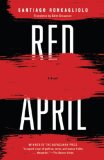Scandinavian crime fiction is the hot new wave, a new niche of bestsellers combining mystery, thrillers and, occasionally, social themes and history. Despite the buzz around fiction from Northern Europe, Red April, the first book by Peruvian author Santiago Roncagliolo to be translated into English, can stand its own in any comparison.
 Red April is built around Peru’s deadly internal warfare of the late 20th Century. Associate District Prosecutor Félix Chacaltana Saldívar has voluntarily transferred from a post in Lima, the nation’s capital, to his childhood home of Ayacucho, the capital of a political region of the same name in the Andes Mountains. The Ayacucho Region was not only where the Shining Path (Sendero Luminoso), a Maoist revolutionary organization, committed what it called its first “act of war” against the Peruvian government, it was one of the areas of the country hardest hit by the brutal tactics of both the terrorist and counter-terrorist forces.
Red April is built around Peru’s deadly internal warfare of the late 20th Century. Associate District Prosecutor Félix Chacaltana Saldívar has voluntarily transferred from a post in Lima, the nation’s capital, to his childhood home of Ayacucho, the capital of a political region of the same name in the Andes Mountains. The Ayacucho Region was not only where the Shining Path (Sendero Luminoso), a Maoist revolutionary organization, committed what it called its first “act of war” against the Peruvian government, it was one of the areas of the country hardest hit by the brutal tactics of both the terrorist and counter-terrorist forces.
The story takes place between March 9 and May 3, 2000, some seven and a half years after the Shining Path’s leader was captured and the organization fell into decline. Chacaltana, a well-intentioned yet odd and naive functionary, is called upon to investigate a severely burned body found in a hayloft. Even though the local police captain declines to perform his agency’s part of the investigation, Chacaltana comes to believe that death has the markings of a terrorist act. This causes problems with the region’s political hierarchy because, as the local Army commander tells Chacaltana, “in this country there is no terrorism, by orders from the top.” Shortly thereafter, though, the commander assigns Chacaltana to be an election judge in a remote area of the region, an experience that leaves him convinced the Shining Path is still active and terrorizing peasants and villagers.
As additional gruesome murders occur, the prosecutor quickly realizes the victims are individuals he has interviewed as part of his investigations. “It’s . . . it’s as if I were signing their death sentences when I leave them,” he says. We follow Chacaltana’s investigation and realizations amidst the many churches and passions of the religious celebrations for which the city of Ayacucho is famous. Is he on the track of a serial killer or confronting a resurgent Shining Path? The book also provides a twist on what American readers have come to call the police procedural. Chacaltana assiduously attempts to follow established procedures, none of which are helpful in this case and in which he meets varying assistance and obstruction from the police captain, the Army commander and a local judge.
Translated by Edith Grossman, Roncagliolo’s writing, pacing and plot make Red April a book that is difficult to put down (I read it in less than 24 hours). At the same time, Chacaltana is a unique protagonist. While he struggles with his own demons, including visiting with his death mother each day in his home, he also helps mediate some of the gruesomeness of the story. His short investigative reports, once of which opens the book, and his attention to them are not only character-incisive, are memorable. Not only do they stand in sharp contrast to notes the killer(s) seem to make after each murder, they reflect both his desire to follow bureaucratic procedures and his own touch of ineptitude. Thus, he reports that the 1,576 residents of a village can’t remember where the individual who found the burned body was because they were as drunk as he during a three-day festival. He also reports that the man was said to be in the hayloft because he was with a married woman, “endowed, according to witnesses, with sizable haunches and a lively carnal appetite.”
In the end, though, Red April is political thriller and commentary as murder mystery. It takes the elements of crime fiction, including the police procedural, and uses them to provide a view of how innocents were caught between the brutality of both the Shining Path and the counterinsurgency. Roncagliolo lends it all an air of authenticity by not only describing tactics used by both sides but taking some of the dialogue from actual contemporary documents. While enjoying the book, readers will feel fortunate that it is not an authenticity derived from their own national history.
If you kill with homemade bombs it’s called terrorism, and if you kill with machine guns and hunger it’s called defense.
Santiago Roncagliolo, Red April







